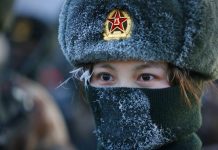In October 2022, India and ten other nations abstained from voting in the UN against China over the human rights situation in the Xinjiang region. Despite global outrage over China’s documented crackdown against Uyghurs, Kazakhs, and other predominantly Muslim ethnic minorities in its northwest region, India has carefully trodden on the issue.
Cut to 2023, just a couple of days after India-China Corps Commanders’ desultory talk, a Uyghur freedom fighter is in India to attend the 6th International Rangzen (Independence) Conference in New Delhi.
The conference, a part of the International Tibetan Freedom Movement, was also attended by the members of the Tibetan government Parliament in Exile.
And another visitor of note has been former Indian Army Chief General MM Naravane. Incidentally, as was reported by the EurAsian Times, he was recently in Taiwan as part of an unprecedented visit by three former Indian Armed Forces chiefs to the island nation.
The former Indian Army chief took to social media to share a photograph with “Geshe Lharampa Bawa Lobsang, representative of the Tibetan Parliament in Exile, and Umit Hamit, a noted Uyghur freedom fighter.” General Naravane signed off the post on X: “Freedom is the birthright of all.”
Speaking to the EurAsian Times, General Naravane said cryptically that the Indian Government is fully aware of the organization of the conference.
“The Indian government must have given permission (for the event), people from abroad (Uyghur freedom fighters) must have applied for a visa in which purpose of the visit would have been given. I don’t think the Indian government was unaware.”
His talk at the conference was very explosive as well. “We need to respect individual freedoms. It was Tibet which was our rightful neighbor and not China. With the forceful occupation of Tibet, their rights have been suppressed. It is important that the present and future generations of Tibetans are able to keep their culture alive,” General Naravane added.
As per the Tibet Rights Collective website, “The conference will focus on strategies to collectively resist and counter the CCP’s (Chinese Communist Party) repressive measures while also seeking ways to strengthen the global Tibetan independence movement.”
Participants at the conference included Tibetan Rangzen (independence) advocates from various nations and delegates from regions such as Mongol and East Turkistan, which have “similarly endured China’s occupation and oppressive policies.”
General Naravane, unlike Taiwan, where he did not speak at the seminar, delivered a talk here where he mentioned his association with the Special Frontier Force (SFF).
SFF is a covert military unit essentially comprising Tibetan refugees, and its existence has never been officially confirmed by India. It was created after the 1962 war between India and China.
The SFF gained its nickname ‘Establishment 22’ after its founder Chief Sujan Singh Uban commanded the 22nd Mountain Regiment in the British Indian Army during World War II in Europe. Headquartered in Chakrata (Uttarakhand), it comprises at least five battalions or about 5,000 commandos who are elite paratroopers trained in mountain warfare.
Its presence came to light in September 2020 when the Indian and Chinese armies clashed along the Pangong Lake in Ladakh when the People’s Liberation Army tried to penetrate the Indian side.
The operation on the South bank of Pangong Tso was carried out by SFF, which is under the control of the Cabinet Secretariat and the Prime Minister’s Office (PMO).
This contrasts India’s side-stepping concerns about the Tibetan refugees in India and the Uyghur Muslims not stepping on the dragon’s tail. In 2018, Tibetans had planned a “Thank You India” event in the National Capital, Delhi, for sheltering Tibetan refugees six decades earlier.
However, India, apprehensive of Chinese reaction at a “sensitive time,” got the event moved from Delhi to the secluded northern town of McLeod Ganj, the seat of the Tibetan government in exile.
In August 2023, India sent its three former armed forces chiefs to Taiwan to participate in a seminar. Only former Indian Navy chief Admiral Karambir Singh spoke at the conference. Former Indian Air Force (IAF) Chief Air Chief Marshal RKS Bhadauria and Indian Army Chief General MM Naravane engaged with Taiwanese leadership and shared India’s point of view.
India’s Chief of Defense Staff (CDS), General Anil Chauhan, has asked the three services to come up with suggestions and options for India if the Taiwan issue precipitates into a full-blown crisis.
India’s Dilemma – To Court Or Counter-Balance China
In the past few months, India has been playing on offensive vis-a-vis China. India-China disputed boundary, also known as the 3,488 km LAC (China claims it to be around 2,000 km long), has largely been peaceful since the 1962 war.

Since the Doklam confrontation between the two countries in 2017, the border has been simmering, and the relations between the two countries have been strained. India has been alarmed by China’s unilateral attempts to change the status quo along the disputed boundary.
On August 10, 2022, India flew the Dalai Lama in an Indian Air Force helicopter from Leh, the capital of Ladakh, to the remote Himalayan village of Lingshed. India’s Ministry of Defense shared photographs of the Tibetan spiritual leaders with IAF officers at the Leh air station and disembarking from the helicopter at a helipad at Lingshed, much to the Chinese chagrin.
The one-month-long visit came when India and China deployed at least 50,000 soldiers at the Line of Actual Control (LAC) in Ladakh and substantially enhanced their weaponry and defense systems there.
Last year, Indian Prime Minister Narendra Modi closed the distance his administration has maintained from Tibetan Spiritual Leader Dalai Lama to ease out its courtship with China.
He greeted the Dalai Lama on his 87th birthday on July 6, riling up China. Reacting sharply, Beijing said India “needs to fully understand the anti-China and separatist nature of the 14th Dalai Lama.”
- Ritu Sharma has been a journalist for over a decade, writing on defense, foreign affairs, and nuclear technology.
- She can be reached at ritu.sharma (at) mail.com




